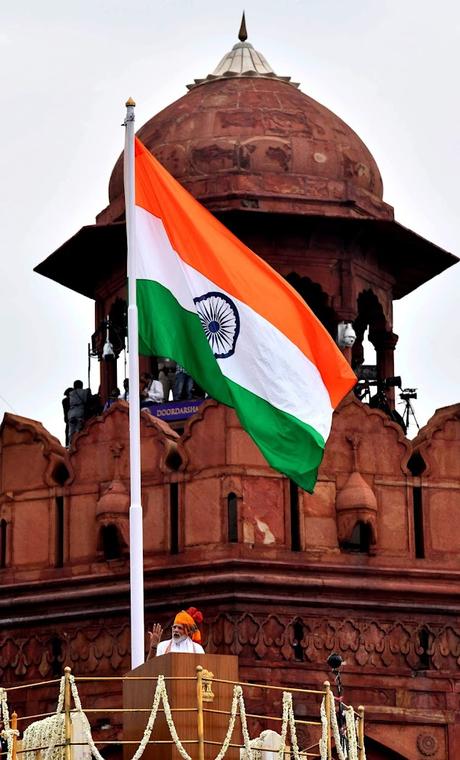எம் தேசம் எந்தன் மூச்சாகும் !! எம் ஆருயிர் தர்மம் உயிராகும் !!

15th August - A great day for the Nation ~ “Independence Day” is around the corner and it is duty of every Indian to celebrate the day by hoisting our National flag in our houses, in Streets, Schools, Offices and in every other place. 75 years ago, it was on this day [rather night] – the Union Jack faded to oblivion descending for one last time from the flagstaff of Viceroy’s house at New Delhi marking the symbolic end to imperialism and the awakening of the spirit of free India.
A flag is a symbolic representation of a Nation and its principles. It is considered a symbol of pride and is unanimously associated with the nation’s spirit and ethos. The National flag of India in its current form was first adopted during the Constituent Assembly held on July 22, 1947. This was a few days before India's independence from the British was declared.
The term "triranga / tricolour" always refers to the Indian national flag. The flag is based on the Swaraj flag, a flag of the Indian National Congress designed by Pingali Venkayya. The flag, by law, is to be made of khadi, a special type of hand-spun cloth of cotton or silk made popular by Mahatma Gandhi. The manufacturing process and specifications for the flag are laid out by the Bureau of Indian Standards. Usage of the flag is governed by the Flag Code of India and other laws relating to the national emblems. The original code prohibited use of the flag by private citizens except on national days such as the Independence day and the Republic Day. In 2002, on hearing an appeal from Naveen Jindal, the Supreme Court of India directed the Government of India to amend the code to allow flag usage by private citizens. Subsequently, the Union Cabinet of India amended the code to allow limited usage.
Karnataka Khadi Gramodyoga Samyukta Sangha (KKGSS) is a manufacturing federation located in the Bengeri area of the city of Hubli in the Karnataka, state of India. It is the only unit in India that is authorised to manufacture and supply the Flag of India. KKGSS was founded on November 1, 1957 by a group consisting of H. A. Pai, Anant Bhat, Jayadev Rao Kulkarni, B. J. Gokhale, Vasudev Rao and B. H. Inamdar who wanted to create a federation to cater to the need and growth of khadi and other village industries. The main product manufactured by KKGSS is the Indian flag. Apart from this, it also manufactures clothes, carpets, bags, caps and bed-sheets made of khadi, soaps, handmade paper and processed honey.
Prime Minister HOn'ble Shri Narendra Modiji on Sunday urged people to put the "tiranga" ('tricolour', the national flag) as their display pictures on social media profiles between August 2 and 15. In his 'Mann Ki Baat' radio broadcast, he flagged a movement called 'Har Ghar Tiranga' (tricolour on every house) being organised from August 13 to 15. "Let us further this movement by hoisting the National Flag at our homes," he said.
The drive is part of 'Azadi Ka Amrit Mahotsav' ('Pious Festival of Freedom'), which has been celebrated with several events and schemes in the lead-up to the 75th anniversary of Independence this year. The PMs said it's turning into a mass movement. On choosing August 2 to begin the social media profile-picture drive, he said the date marks the birth anniversary of Pingali Venkayya, "who designed our national flag". Venkayya's initial design in 1921 — which he presented to Mahatma Gandhi -- was, in fact, slightly different from what eventually became the national flag, but it served as a prototype. His design had the three colours that we have today, but had a charkha (spinning wheel, a symbol of self-reliance) at the center.
PM Shri Narendra Modiji also referred to "Madam Cama", whose full name was Bhikaiji Rustom Cama, as having played "a key role in giving shape to the national flag". Her version from 1907 had three colours too, besides several cultural and religious symbols, with 'Vande Mataram' in the center.
For the 'Har Ghar Tiranga' campaign, the central government has also tweaked the Flag Code. Now, all kinds of materials can be used for making the flags — polyester, cotton, wool, silk and Khadi bunting material — while earlier machine-made and polyester flags were not allowed. There is also no restriction on the size of the flag, neither on the timing of its display. Earlier, the flag was allowed to be flown only from sunrise to sunset. According to an official statement, over 20 crore national flags would be unfurled on top of houses for the three days.
PM Modiji, in the address, mainly focused on events to celebrate Independence. "People from all walks of life and from every section of the society are participating in different programmes across the country," he said. "When India completes 75 years of its Independence, all of us are going to witness a glorious and historic moment." He spoke of some schemes of his government, too. Fairs of several cultures also found a mention, as did Ayurveda. He also congratulated sportspersons who achieved success during July.
Janani Janmabhoomischa Swargadapi Gariyasi ~
Mother and motherland are superior to Heaven."
Saluting our "Maha Bharat" ::Vandhe Matharam ~ Jai Hindusthan ~ Jai Jawan ~ Jai Kisan ~ ever in the feet of Bharat Matha…
With reverence to holy motherland – S. Sampathkumar
31st July 2022

